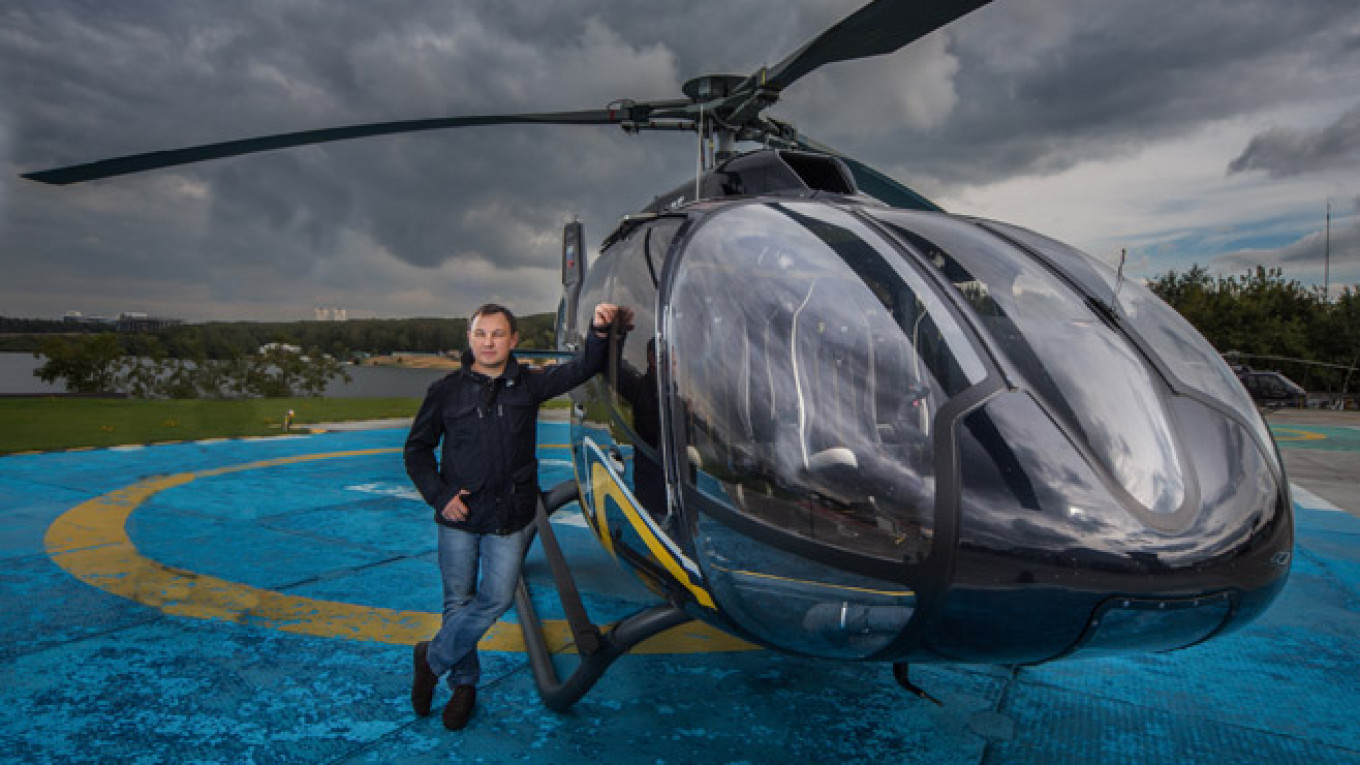A year ago, Russia's private helicopter market was virtually non-existent.
There have been companies flying two or three helicopters, often old ones, but few rich people were buying flying windmills of their own. Wealth-flaunting millionaires bought yachts.
Today, the market is in place and it has its own king, Alexander Khrustalev, a renowned Moscow real property tycoon who now claims to sell in Russia three of every four Robinson helicopters, the most popular small copters worldwide.
Khrustalev, 43, runs his business empire, NDV Group — which employs over 1,600 people — from his office overlooking Trubnaya Ploshchad in central Moscow. He tracks his construction sites, offices and helicopters using some 200 webcams, and as he talks, he flips over rows of camera feeds on his tablet and checks live footage projected on a huge screen hanging on the wall of his office.
"When I started my business career, I was doing everything myself and staggering from weariness every night," says Khrustalev, a lively man with close-cropped hair and rather colloquial Russian. "Then I built my team, learned to delegate, and now monitor everything from here."
Still, the urge to micromanage seems to sit deep in the realty magnate, who began his business career running food kiosks in the Tver region in the early 1990s. As he talks about his favorite project, Heliport Moscow, a three-hectare multifunctional center for storing and servicing helicopters complete with a pilot training facility, he checks what is going on at a couple of dozen locations on the site through webcams and texts quick orders to site managers.
The Moscow Times sat down with Khrustalev earlier this month to talk about his ascent to near-monopoly status in the Russian private helicopter business and his plans to convert the industry into a tool to develop Russia's not-so-easily accessible natural splendors into profitable tourist destinations.
This interview has been edited for length and clarity.
Q: How did you arrive at the idea of entering the helicopter business?
A: At the start, it was a whim. I bought a helicopter, got trained as a pilot and built a helipad outside Moscow near Novorizhskoye Shosse. It turned out that I had picked the right place because other helicopters started landing there. You know, the big H on it is easily seen from above. So I decided to build on it.
We started less than a year ago. Now it is the biggest heliport in Russia and it is growing every day as we build new landing pads, service facilities, hangars and a training center. We also plan to build a hotel and a yacht club there. We have another heliport in the Moscow region, Heliport Istra, and I plan to build one more in Ulyanovsk [a city on the Volga river, 900 kilometers east of Moscow — MT].
Today I believe I have seized 75 percent of the market of new Robinson R44 helicopters being sold in Russia — about 18 percent of the global market. I think we will sell 70 to 80 helicopters before the year's end at a cost of 650,000 to 700,000 euros. We also sell bigger, more advanced helicopters from Robinson, Bell, Eurocopter and AgustaWestland companies, with the most expensive running up to $11 million.
Before I entered the market, there was only one company that managed to sell 14 helicopters in Russia. I sold 14 helicopters in my first three months.
I see how one opportunity leads to others. For example, we opened a training center for pilots. Now 150 people attend courses there. I know there are at least 50 potential buyers of helicopters from me among them. And these helicopters will be repaired and kept at my facilities.
I would guess there are 350 privately owned helicopters in the Moscow region, which is about 60 percent of the overall number in Russia. Out of these 350, 150 are stored and serviced at my hangars, and 100 more are only serviced and repaired at our heliport. In the Moscow region, I believe we have 90 percent of the maintenance and repair market.
Overall, I identified 19 sources of revenue in my heliport — from sales to repairs, cafes, training, storage and so on.
Q: How profitable is this business? Who are your clients?
A: I started this project with my own money. I invested 2 billion rubles ($44 million) from NDV Group, and now the money coming from this business is re-invested into its growth. I don't have to add anything from my own pocket.
I am not afraid of the unfolding crisis in our economy. It won't bring this market down because there was no market. I am now creating it. Yes, there were a dozen companies that believed they could do business with their two or three old helicopters. I came into this pool like a whale. I've got the best people, I am paying them decent salaries — 100,000 rubles ($2,200) a month on average — and it works.
As for clients, I am not sitting idly and waiting for them to come. If someone orders a taxi ride on a helicopter and comes to the heliport, he will see that out of my own 22 helicopters only two are available. The rest are in the air, working.
I will not be waiting until someone calls and asks to take a helicopter. I will find customers myself. For example, I call companies that monitor the electrical grid and offer them my services. They use helicopters, each carrying three pilots and burning 800 liters of fuel per flight hour. This hour costs them 200,000 rubles ($4,400). When we're talking about hundreds of kilometers, this is quite expensive. I offer them one Robinson R44 with one pilot, burning 50 liters per hour, with my own special equipment to monitor the grids, which comes out way cheaper. We are working on such projects now.
In agriculture, we can help to fight bark beetles and other crop pests from the air.
Aerial photography is also a huge market. Demand for it is colossal. I talked to one regional governor recently who offered me 10 million rubles ($220,000) to photograph his region from air. I am ready to commit one helicopter with all necessary equipment for one month to earn this 10 million. These are just few examples.
Also, I was recently in Miami and saw small planes flying advertisement banners. When I returned to Moscow, my helicopters did the same for a week for Leroy Merlin, which was opening one of its hypermarkets outside Moscow. I found this job.
My helicopters can also fly banners like "Happy birthday, my love," ordered by private customers, over their homes outside Moscow. This service costs 35,000 rubles ($750) per hour.
There are social services we do too. Together with Lisa Alert [an NGO searching for missing people — MT], we look for missing children in the Moscow region. We help find mushroom seekers and hunters lost in the woods. This year we found about 30 missing people. One helicopter is as good as 1,800 men on the ground in search operations.
We also participated in nabbing the infamous GTA gang [which robbed and killed motorists outside Moscow — MT] recently. During the night searches specially trained people were flying on my helicopters, equipped with special thermal visors, searching for the bandits.
Q: Have mutual sanctions and the general cooling of relations with the West affected your helicopter business?
A: Western sanctions are aimed against state companies. They don't touch us. I talk to my foreign partners, they all want to preserve their presence on the Russian market. And thank God our own government does not counter Western sanctions by banning us from buying foreign helicopters. If this happens, our sector will be killed.
We have really good working relations with our Western partners. My flight instructors are being taught in Canada, France and the United States. Five of my engineers are now being trained at Robinson's engine labs.
I have over 40 engineers and the cost of training one engineer to repair only one type of engine is between $27,000 and $35,000.
Q: How is the government reacting to your efforts to build a new industry?
A: There is state regulation for our industry, which is sometimes plain stupid and corruption-promoting. It was written when there was no market, and who if not me should help the government to create new, better rules?
A simple real-life example: You live in the Far East and you buy a copter for yourself. Every two years, you should prolong its airworthiness certificate. For that, you need to come with the paperwork to Moscow, submit it to particular officials through the single window that serves the whole of Russia and then to wait for six weeks for the certificate to be re-issued. How much will it be worth if none of these officials ever saw the actual helicopter?
During these six weeks you cannot fly.
I am a member of the government Commission on Development of Common Aviation. Several weeks ago I spoke about this problem at a commission meeting. They agreed that it is not officials but engineers that service helicopters who should be responsible for the technical condition and safety of helicopters, they way we have it with automobiles.
In December, this initiative will be discussed at a government meeting and, if supported, there will be a government decree on changing the certification rules for helicopters.
There are plenty of such wrongs in the system. No one cared about it before. In our country, you may scold the system or weep over it but it won't change anything. You need to get inside and start reforming it from there.
If we manage to build the right relations between business and government, our sector will have a huge positive impact on many other industries, from producing special fuels for copters to construction.
Today my heliports, Moscow and Istra, employ 250 people. Here on my table lies a plan to develop a network of heliports in the Moscow region that will create 6,500 new jobs in five years.
Q: So, you've become the major player in this industry. What's next?
A: The heliports should become the first step toward a much more ambitious program of developing internal tourism, which should be supported by the state.
In Russia, we have unreal natural beauty — Lake Baikal, the Altai Mountains, Karelian forests. We have more than 150 national parks, and we don't see most of them. We should open them to people.
To reach these places and to provide comfort to visitors, we need to build tourist villages there and solve the transportation problem. I am not saying that helicopters will be the decisive factor in this infrastructure, but they will be pioneers in transportation, using small aerodromes in these virgin places.
With one department of the Natural Resources Ministry we are working on a development program for national parks. We should start flying over then and look where we can build so-called ethnic villages, say, in Siberia or Yakutia, to attract tourists. Abroad, these are whole thriving industry. We sell oil and gas abroad but we do not care about marketing and developing the beauty of country.
Helicopters exist for flying. Flying to your dacha is fine, but flying to discover the great places Russia is so rich in is an absolutely different pleasure.
Contact the author at [email protected]
A Message from The Moscow Times:
Dear readers,
We are facing unprecedented challenges. Russia's Prosecutor General's Office has designated The Moscow Times as an "undesirable" organization, criminalizing our work and putting our staff at risk of prosecution. This follows our earlier unjust labeling as a "foreign agent."
These actions are direct attempts to silence independent journalism in Russia. The authorities claim our work "discredits the decisions of the Russian leadership." We see things differently: we strive to provide accurate, unbiased reporting on Russia.
We, the journalists of The Moscow Times, refuse to be silenced. But to continue our work, we need your help.
Your support, no matter how small, makes a world of difference. If you can, please support us monthly starting from just $2. It's quick to set up, and every contribution makes a significant impact.
By supporting The Moscow Times, you're defending open, independent journalism in the face of repression. Thank you for standing with us.
Remind me later.







